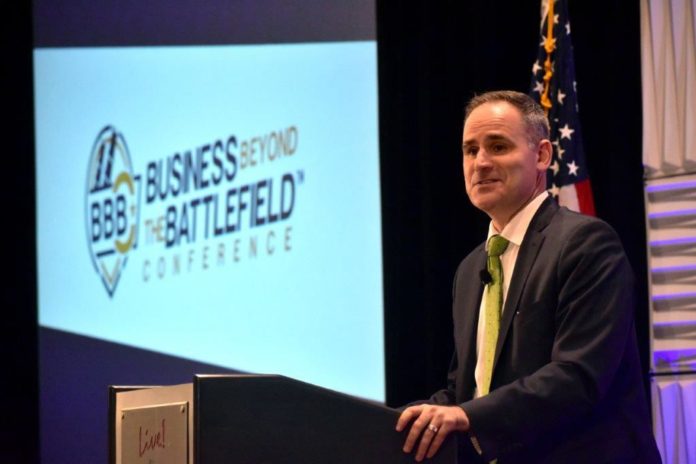The U.S. Small Business Administration (SBA) observed its sixth annual National Veterans Small Business Week with hundreds of events hosted throughout the nation, which included locations in North Texas.
SBA held expositions, conferences, forums, training exercises and education programs to bolster the veteran and military-owned business community.
According to data from SBA, nearly one in ten U.S. small businesses are owned by veterans, who employ about six million workers.
There are about 215,000 veteran-owned small businesses in Texas. Those small businesses generate about $110 billion in annual sales and therefore boost the economy, according to SBA. The numbers are projected to increase in the coming years.
To address and show support to the growing veteran and military businesses, SBA’s acting administrator Chris Pilkerton also took a trip down to North Texas, as a part of the National Veterans Small Business Week.
Pilkerton gave a presentation in a packed conference room at Live! by Loews in Arlington on Thursday, Nov. 7.
The 4-day Business Beyond the Battlefield Conference aimed to increase awareness and facilitate access to entrepreneurial development resources to the military-connected business community.
Prior to making the keynote address, Pilkerton visited Mesquite-based Taiga Coolers, a veteran-owned manufacturing company.
Taiga Coolers previously received SBA-backed capital loan. It has now expanded business internationally in the high-performance cooler market.
Pilkerton was also joined by Larry Stubblefield, SBA Head of Veteran Business Development, in the visit.
Pilkerton talked to Fort Worth Business Press after his keynote speech in Arlington about the state of veteran-owned small businesses.
FWBP: What made you want to come to this event and to North Texas?
Pilkerton: It gives us an opportunity to meet with veterans small-business owners and learn from them, as well as talk about some of the resources that SBA provides to our nation’s veterans.
At the SBA, we’re here to help support them from counseling perspective, capital perspective, government-contracting perspective.
FWBP: Many might not be aware of the resources SBA provides. What are you doing to change that?
Pilkerton: The SBA has 68 district offices across the country. One of the most important things we can do is outreach. We work with not only our local district offices, but also our resource partners – Small Business Development Centers, the SCORE network of retired executives who counsel, as well as our Veterans Business Centers. We’re spending time with them so that folks will learn and continue to learn about SBA’s resources.
FWBP: What kind of impact veteran entrepreneurs might have to the economy?
Pilkerton: Veteran unemployment is at historic lows. But we continue to encourage folks to start small-businesses. The economy is booming right now. The stock market is at all-time high. And general unemployment is very low. Because of all the policies that the administration has put in place, we see great opportunities for our domestic economy.
Talking about the U.S. administration, do you think the renegotiated NAFTA trade agreement between U.S, Mexico and Canada would be beneficial to small-businesses, if and when it goes into effect?
Pilkerton: We see great opportunities for small-businesses in exports all around the world.
In fact, this is the first time that there’s an entire chapter in the agreement for small businesses. It talks about fairness, it talks about intellectual property protection. And this is really important because small-businesses realize that in order for them to grow they want to be able to export to larger community.
How might the trade deal affect Texas’ small-businesses?
Pilkerton: There’s a natural trading relationship as far as small-business exports from the State of Texas and Mexico. I think there will be great opportunities and great economic impact for both the U.S. and Mexico.
What might the future hold for small-businesses in North Texas and elsewhere?
Pilkerton: Recently, there’s been a number of surveys that have come out that talk about the optimism levels for small businesses are historically high. What the administration is doing right now is really focusing on these small-businesses as the engine of our economy.
I would encourage any local official in this area to really think about how they can bring in an opportunity to their town that they can then pitch to these different funds. There’s a lot of interest in this right now. And we want to encourage local municipalities, town councils to be creative and ready to go when those investors call.






